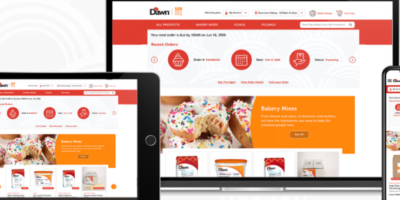
It’s no secret that COVID disrupted the world of B2B ecommerce. Market tendencies and evolving buyer expectations have pushed B2B distributors to rework sooner than ever earlier than.
With fast digital transformation now the norm, agile organizations can’t justify the intensive funding that’s required with on-premises or self-hosted options.
Within the realm of B2B ecommerce know-how, we’re seeing a number of shifts out there. Listed below are the highest three tendencies which can be defining new B2B ecommerce implementations.
1.—“Bolt-on” ERP integration isn’t working for producers
Third-party-dependent integrations have by no means been nice for organizations whose enterprise lives within the ERP. If the corporate doesn’t have sufficient IT assets to dedicate to integration, information issues can come up—and finally, these turn into buyer expertise issues.
This development is barely intensifying as market pressures push corporations to launch B2B ecommerce sooner—and with all of the integrations that prospects want to finish transactions.
Typical considering mentioned {that a} standalone platform was enough for all organizations and all B2B use instances. In case you wanted ERP integration, you can select from a variety of third-party “connectors” to maintain your ERP and your B2B ecommerce retailer in sync.
ERP-dependent organizations are discovering this structure unmanageable. It creates three duplicate techniques (ERP, B2B ecommerce, and an integration answer), every with its personal copy of all ERP information and logic. If enterprise guidelines change within the ERP, it’s important to change them accordingly within the different two techniques or synchronization will create errors.
Having three techniques means you’ll want three separate groups. Whether or not you outsource that requirement or employees it in-house, it’s not low cost—and the prospect of coordination issues is excessive. This is the reason we see an rising demand for B2B ecommerce options that embody real-time ERP integration.
2.—Integration-first platforms are empowering B2Bs to launch ecommerce quick
Within the newest Wave Report for B2B Commerce, Forrester referred to as out how integration-first platforms are disrupting the market.
“As monolithic know-how turns into outdated and fewer efficient, the suppliers that lead the pack reveal deep, prebuilt integrations and powerful enterprise person tooling.”
Given the pressures of the post-COVID world, it is smart that the market would flip to various architectures for B2B ecommerce and ERP integration. And with customer-centric focus teams influencing the ultimate form of B2B ecommerce options, organizations are discovering that they want ERP integration from the very begin of the undertaking. With out it, they will’t get reasonable suggestions from prospects.
3.—Cloud is the way in which ahead in B2B ecommerce
Within the SAP market, we’re seeing an uptick in prospects transferring off of ECC 6.0 and onto S/4HANA. As economies proceed to settle after COVID disruption, it seems that enterprises are ultimately starting emigrate their ERPs to the cloud.
We’re seeing the identical choice for cloud in relation to B2B ecommerce. With fast digital transformation now the norm, agile organizations can’t justify the intensive funding that’s required with on-premises or self-hosted options. And with immediately’s commoditized B2B ecommerce know-how, it’s usually simpler to fulfill your wants with a SaaS answer than with a extra conventional internet hosting mannequin.
The outdated mannequin for B2B ecommerce required distributors to rearrange their very own internet hosting, whether or not with {hardware} owned and maintained in-house, or by a internet hosting supplier. Whereas this mannequin gave corporations better management over their options, it additionally put extra accountability on their shoulders.
With immediately’s fast-paced world of digital evolution, many organizations are discovering they will’t pivot shortly sufficient with on-premise options. It’s a heavy elevate for IT departments which can be already scrambling within the wake of COVID disruption.
Whether or not it’s SaaS (software program as a service) or PaaS (platform as a service), one factor is obvious. Producers and distributors want agile, scalable options for B2B ecommerce. That’s why they’re leveraging the economies of scale that solely a cloud-hosted mannequin can present.
George Anderson is a advertising and marketing supervisor at Corevist Inc., which gives producers with software program to launch B2B ecommerce portals built-in with SAP ERP software program. Join with him on Twitter or LinkedIn. A portion of this text first appeared on the Corevist weblog. A portion of this text first appeared on the Corevist weblog.
Favourite



















